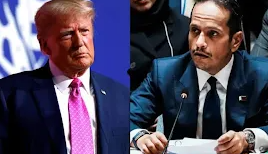Best Free Resources for Traders in 2025: From Charts to AI Alerts
December 01 , 2025

U.S. President Trump hosts Qatari PM following Israeli strike in Doha. What was said, how Qatar reacted, and what this means for U.S.–Middle East diplomacy.
In the wake of a controversial Israeli strike on Hamas leaders in Doha, U.S. President Donald Trump met with Qatari Prime Minister Sheikh Mohammed bin Abdulrahman al-Thani in New York. The discussions, held over dinner, signal a tense yet strategic moment in Middle East diplomacy—where U.S. interests, regional alliances, and ceasefire efforts are being reassessed in real time.
Earlier in the week, Israel conducted an airstrike in Doha targeting political leaders from Hamas. Casualties included several Hamas members and a Qatari security officer. The strike significantly disrupted ongoing ceasefire negotiations, threatening to derail U.S.-mediated diplomatic efforts. The attack drew wide condemnation from many nations, including Qatar, which accused Israel of undermining peace processes.
President Trump hosted Prime Minister Sheikh Mohammed bin Abdulrahman al-Thani at a dinner in New York shortly after the strike. Also present were Special Envoy Steve Witkoff, Vice President J.D. Vance, and Secretary of State Marco Rubio. Prior to the dinner, al-Thani had met with Vance and Rubio at the White House. These meetings focused on Qatar’s role as mediator, discussions on defense cooperation, and the implications of the recent Israeli action.
President Trump expressed displeasure with the Israeli strike, describing it as a unilateral action that did not align with broader U.S. or regional interests. He reportedly conveyed to Israel’s Prime Minister that such attacks could jeopardize diplomatic relations and ongoing negotiations. The United States is emphasizing a balanced approach: affirming support for Israel’s security needs while also preserving relationships with key Arab allies.
Qatar accused Israel of trying to sabotage chances for peace. Despite the anger, the Qatari leadership reiterated they remain committed to their role as mediators in the Gaza conflict, including continuing efforts toward a ceasefire and hostage negotiations. Sheikh Mohammed asserted that the strike would not deter Qatar from its diplomatic path, though he demanded stronger assurances from allies like the U.S.
This meeting underscores the delicate balance the U.S. must navigate in the Middle East. On one hand, maintaining strong relations with Israel is a strategic priority. On the other, the U.S. must manage its relationships with Gulf countries like Qatar, which are critical in mediation and regional stability. The Israeli strike in Doha has exposed fractures in how these priorities align under crisis.
The timing of the strike, while high tensions were already present, threatens to undermine talks aimed at ending years of conflict in Gaza. The meeting between Trump and al-Thani will likely involve discussions on how to prevent further unilateral actions and ensure that mediators can operate without fear of reprisal. Washington is under pressure to show it can influence Israel’s decisions in ways that preserve diplomatic channels.
Defense cooperation is now part of the conversation. The U.S. and Qatar are expected to explore ways to strengthen their security collaboration, especially given that the strike took place on Qatari soil. Ensuring Qatar’s sovereignty and protecting its role in peace processes are emerging priorities for U.S. policymakers who wish to avoid escalating the conflict further.
In the days ahead, several outcomes are likely to unfold:
The dinner between President Trump and Qatari Prime Minister Sheikh Mohammed bin Abdulrahman al-Thani comes at a critical juncture. The Israeli strike in Doha has not only inflamed diplomatic tensions but also challenged ongoing efforts for peace in Gaza. The U.S. appears to be trying to recalibrate its role—seeking to condemn actions that risk derailing negotiations while maintaining ties with both Israel and Gulf mediators. How Washington and its partners now move forward could shape the trajectory of diplomacy and conflict in the region for months to come.
#IsraelDohaStrike #TrumpQatarMeeting #MiddleEastDiplomacy #PeaceNegotiations #QatarMediator #USForeignPolicy